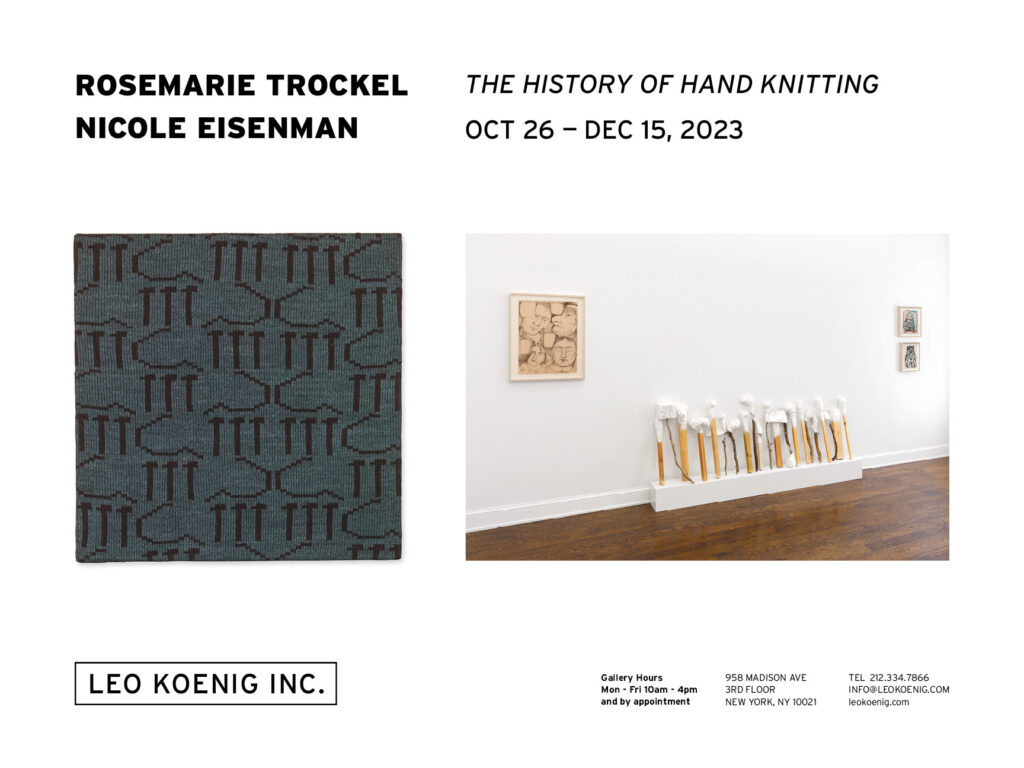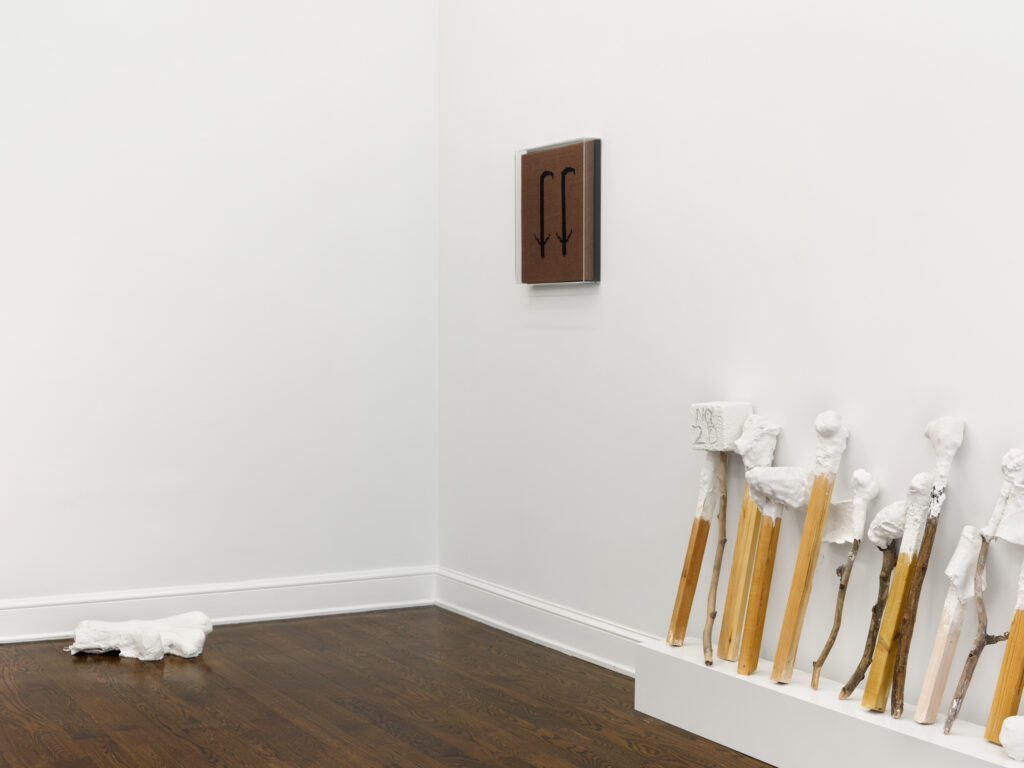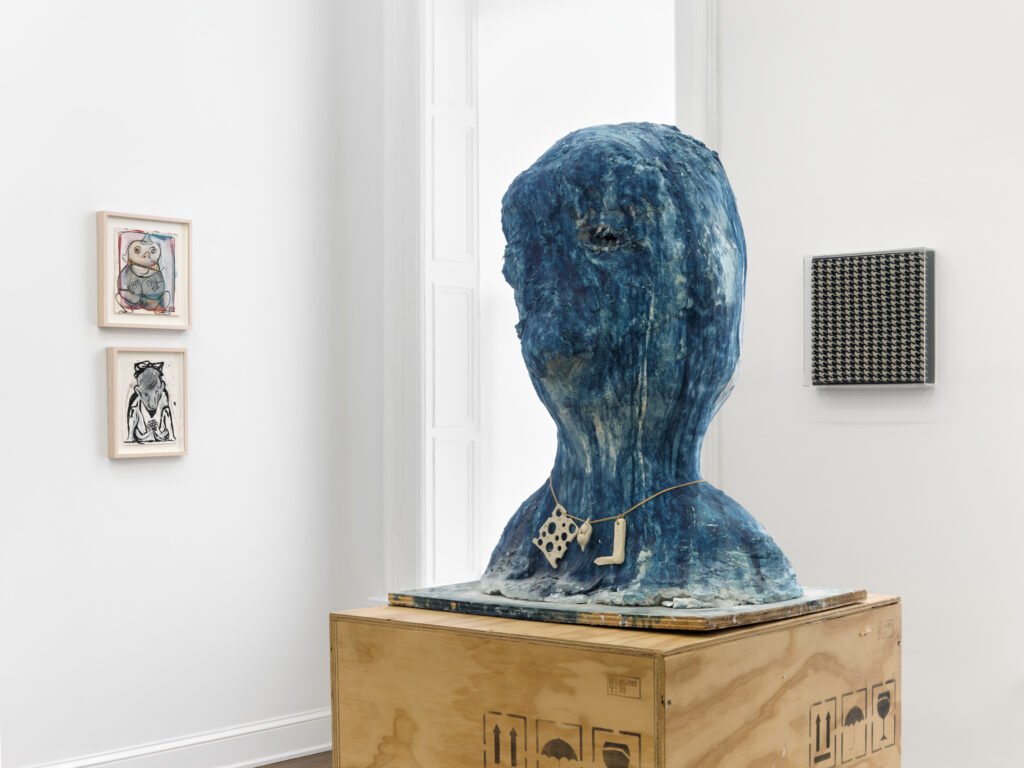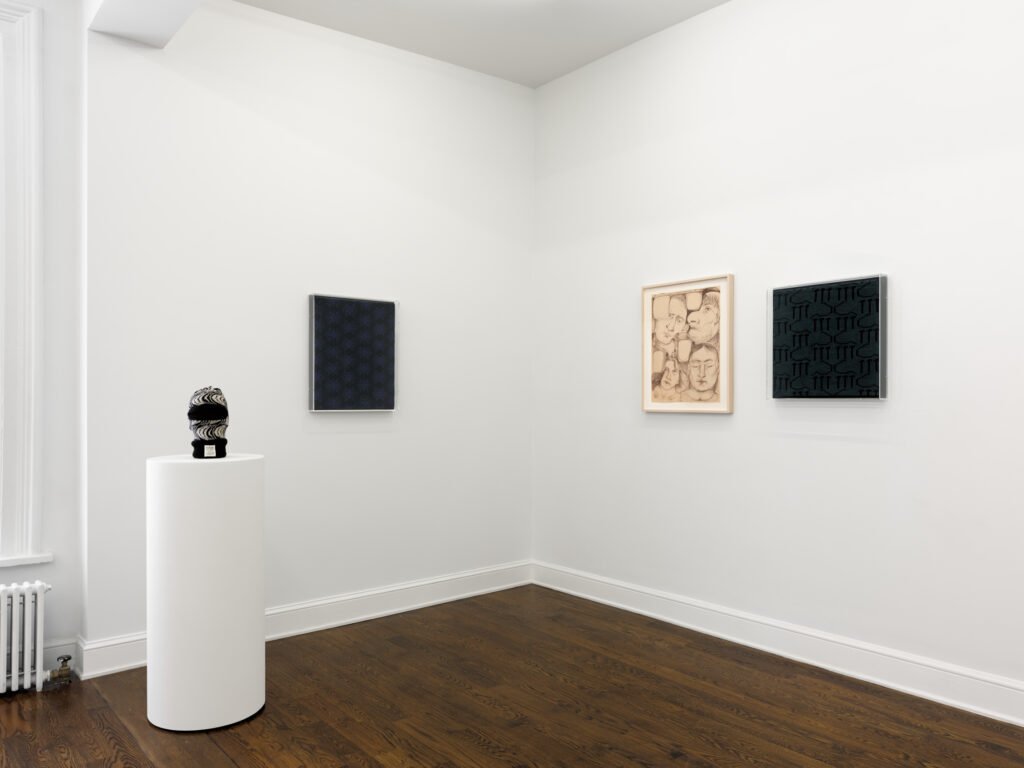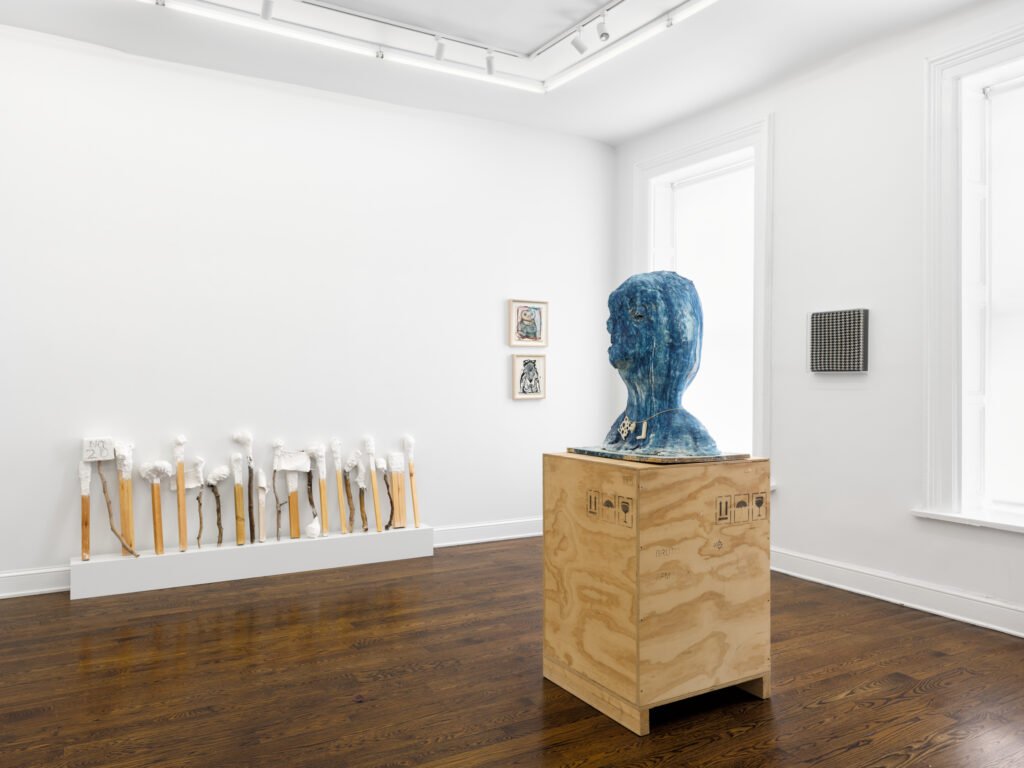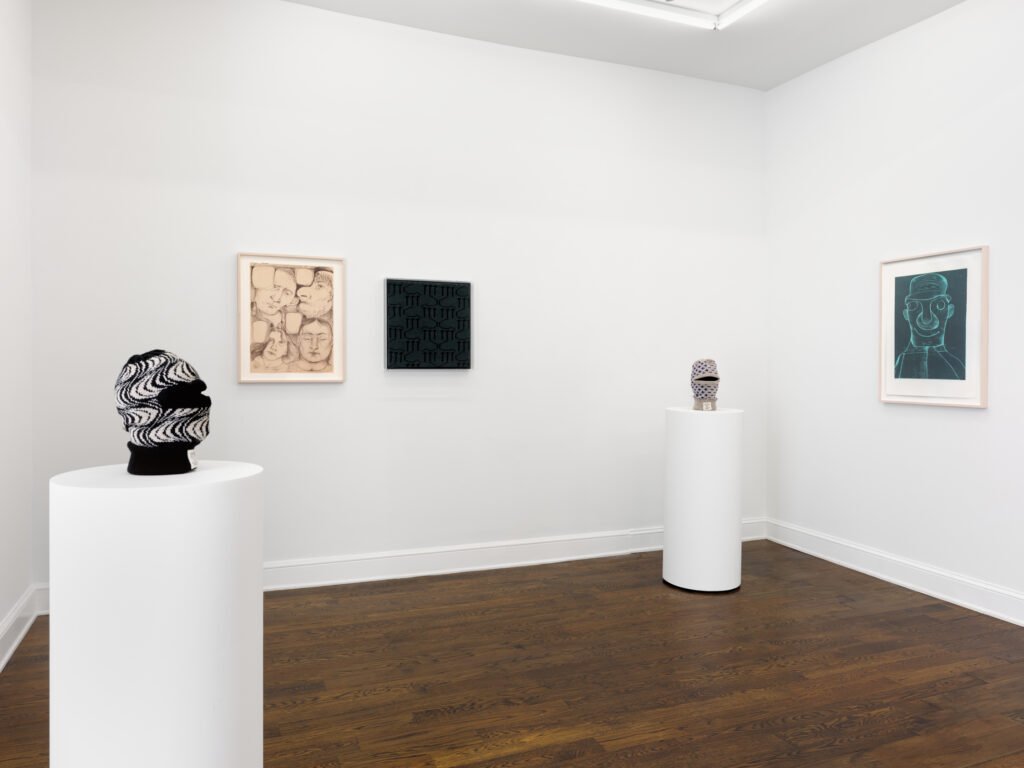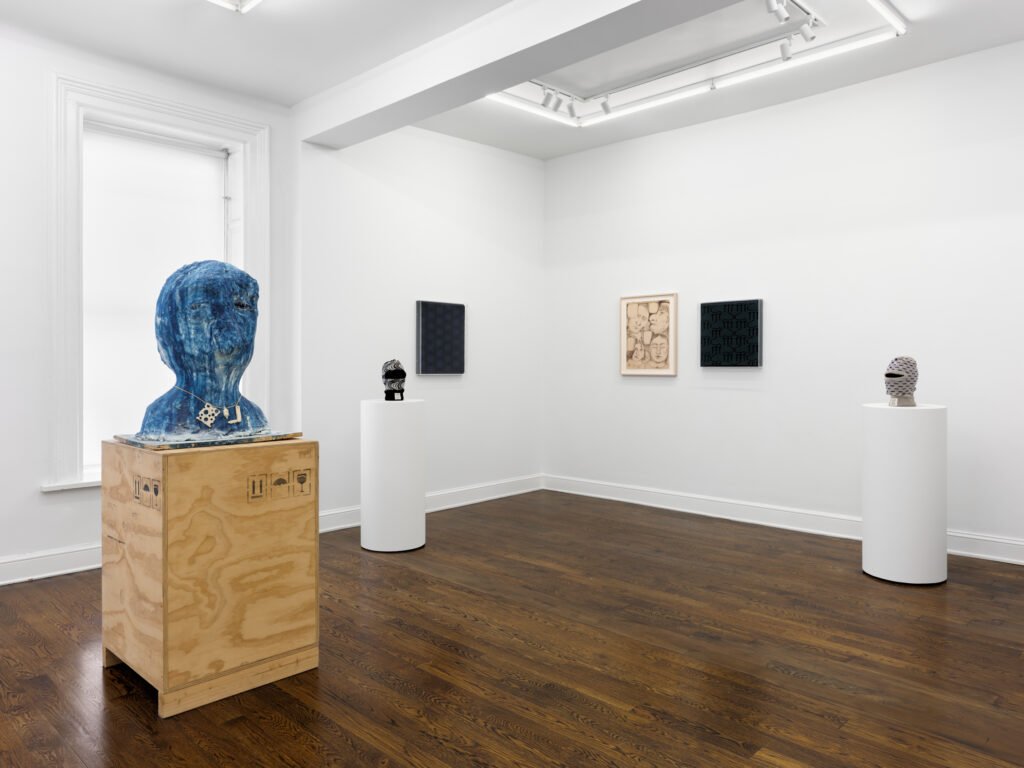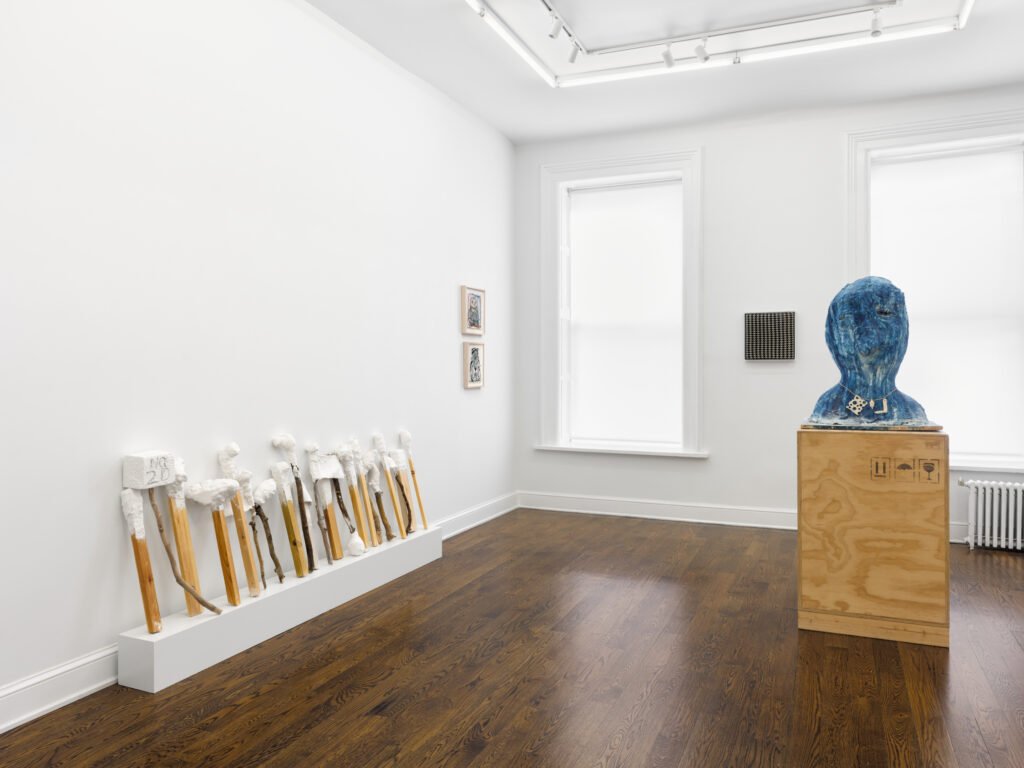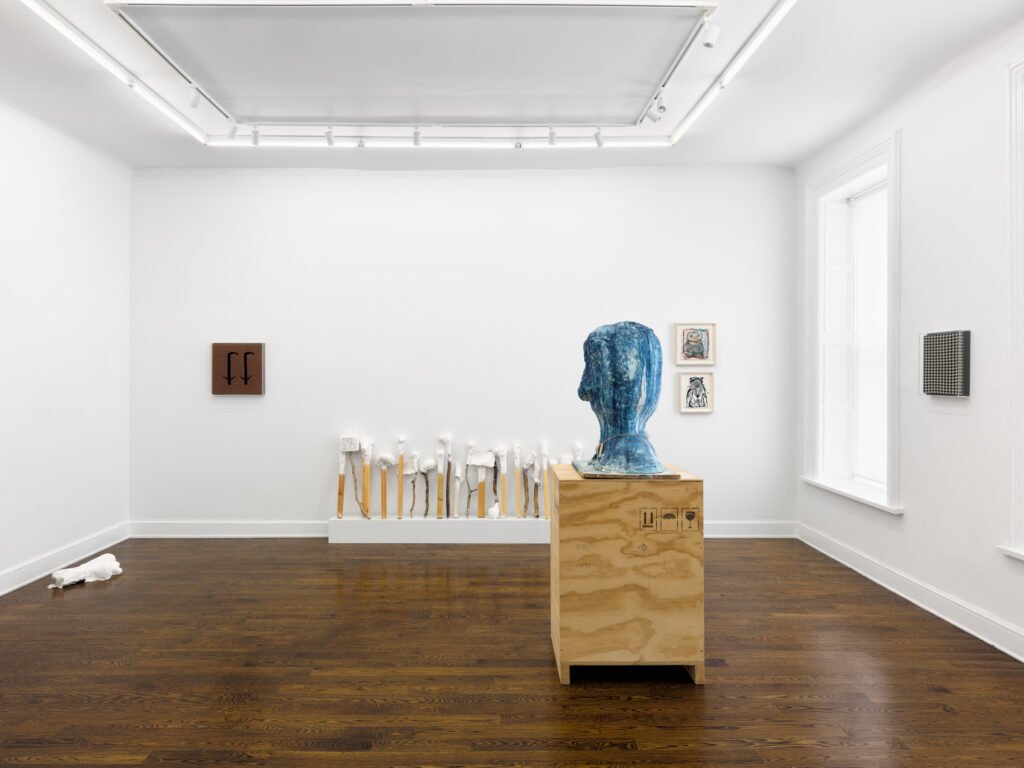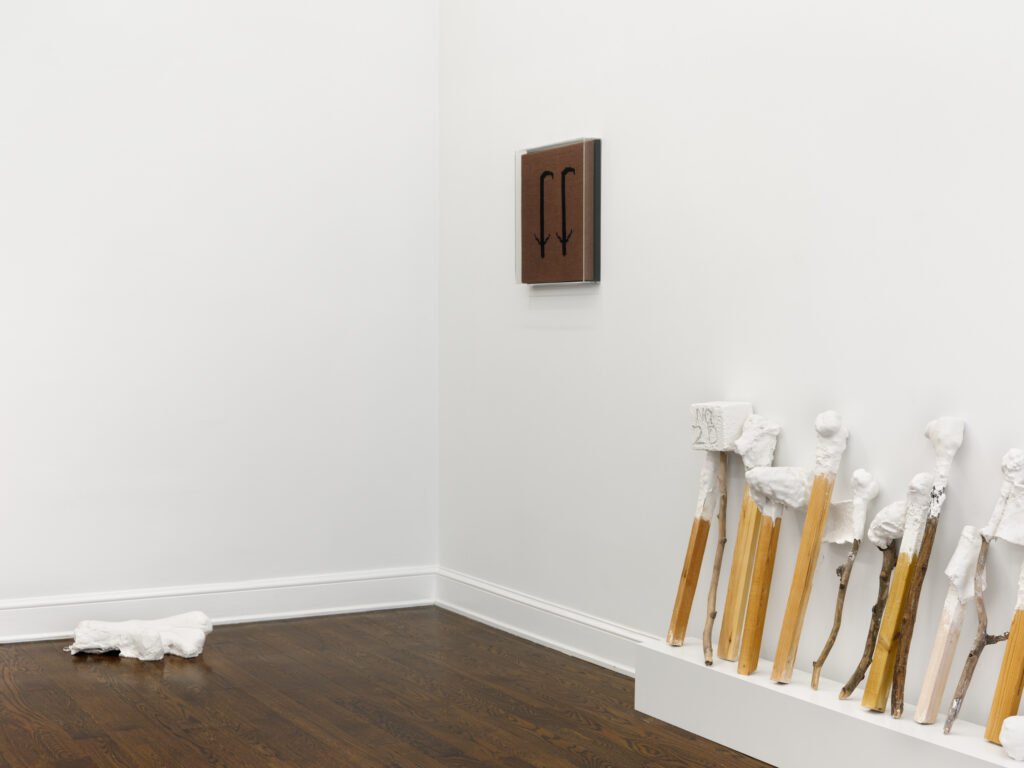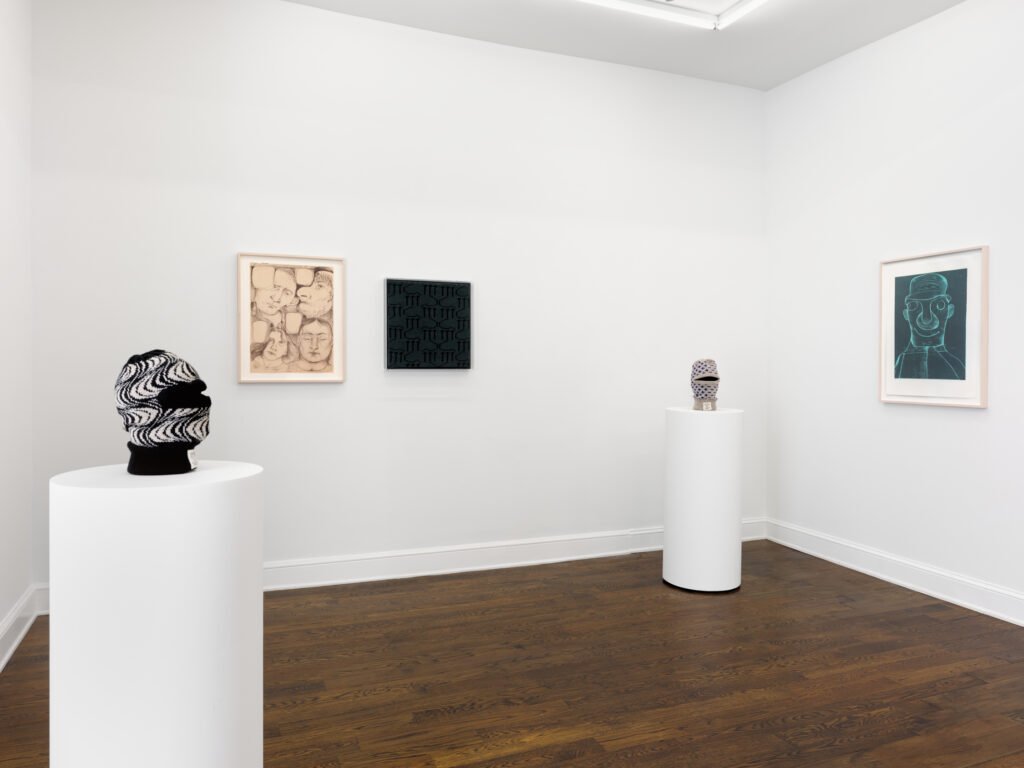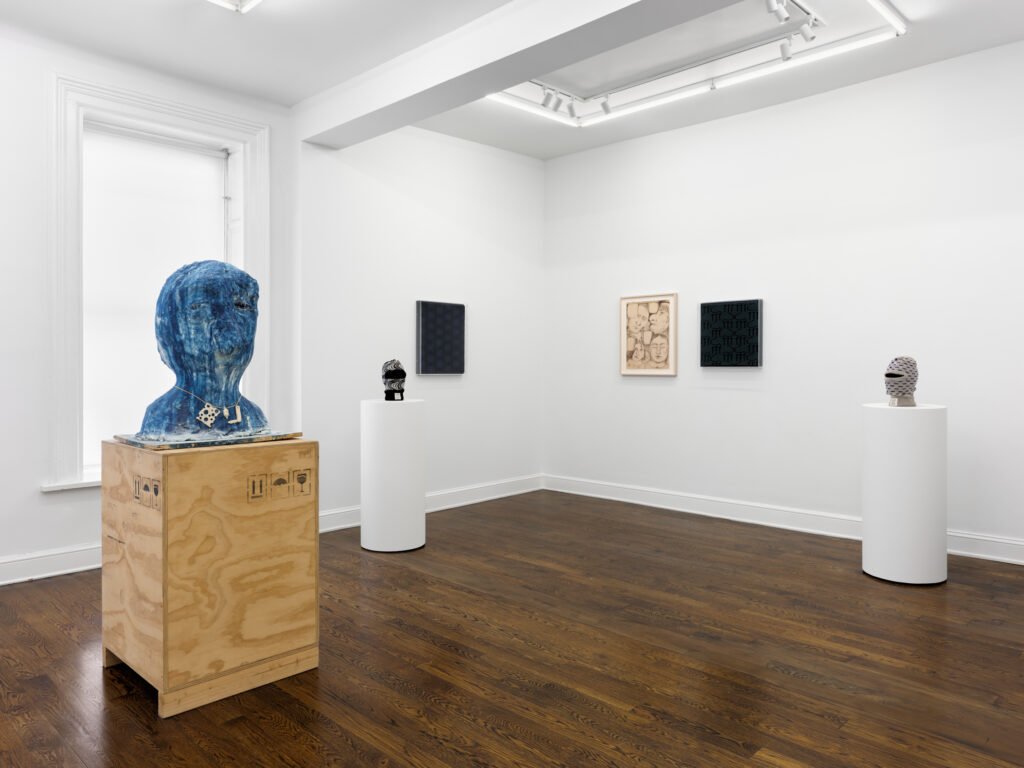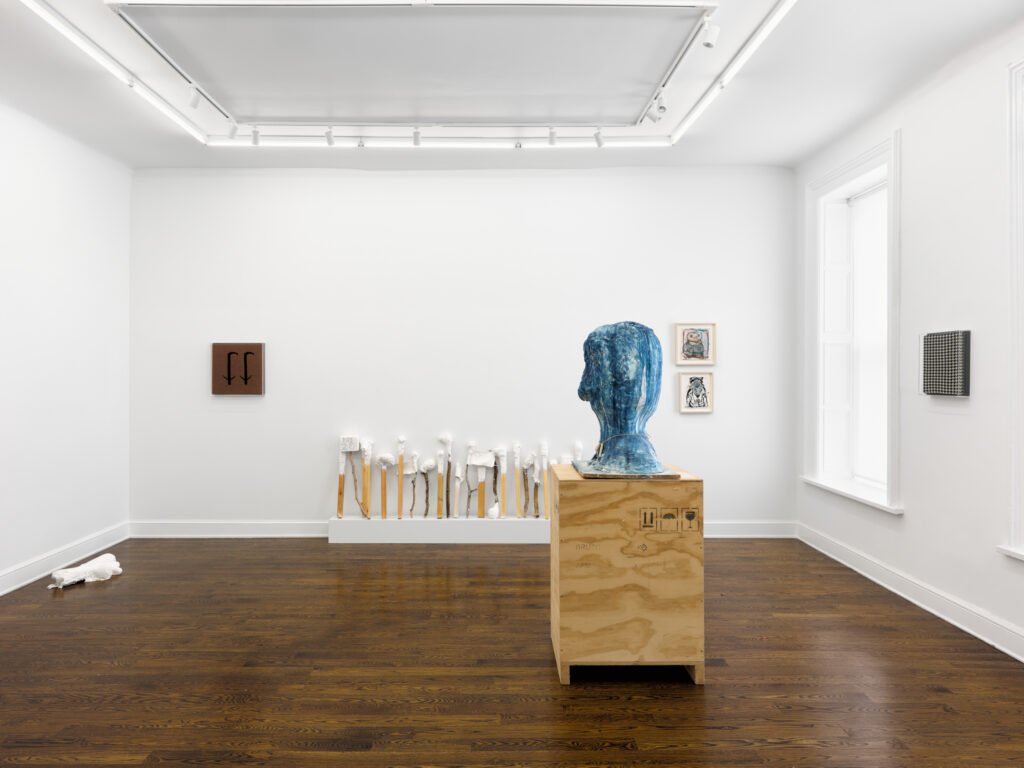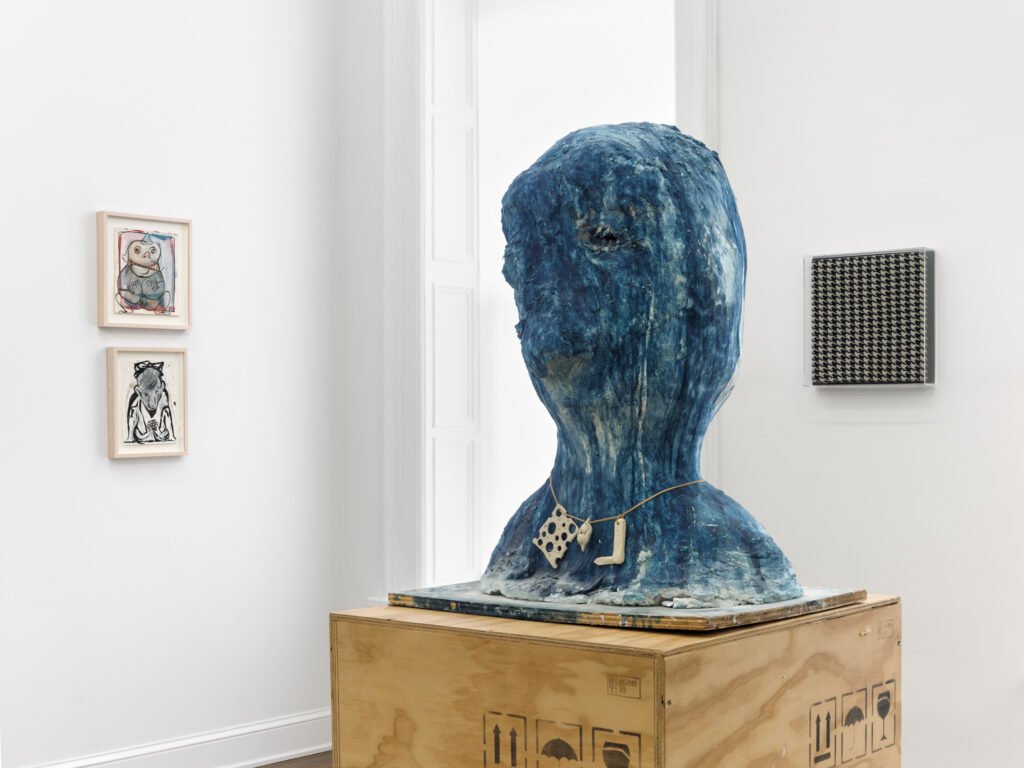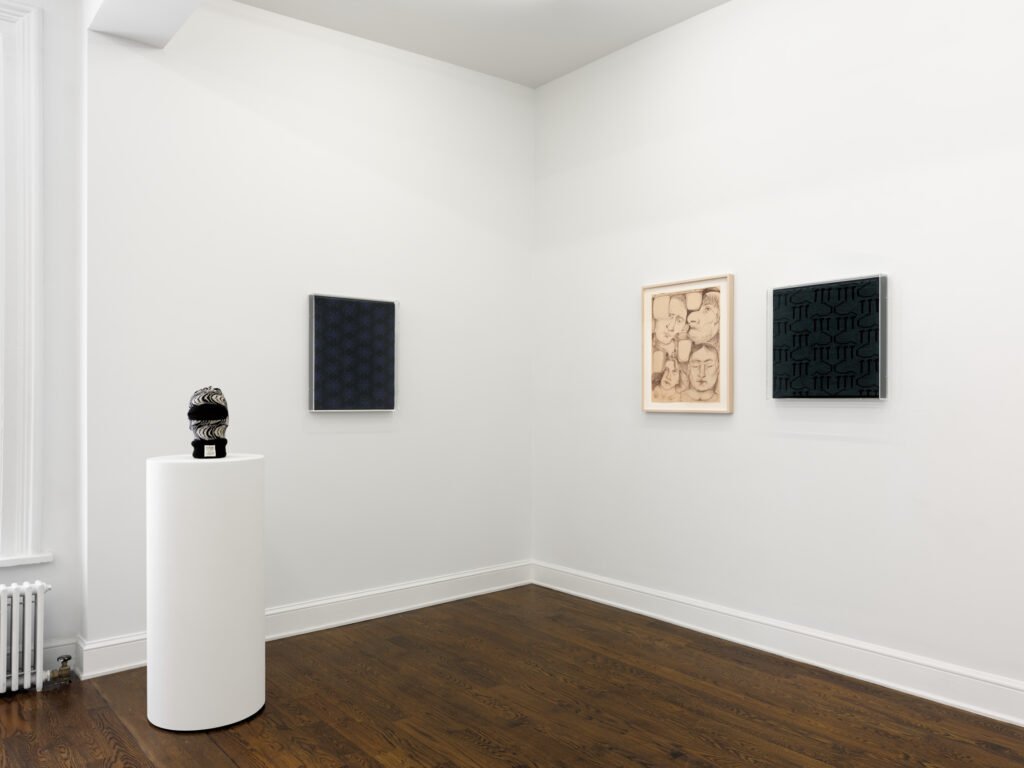Press Release
The History of Hand Knitting
Rosemarie Trockel
Nicole Eisenman
October 26 through December 15,2023
Leo Koenig inc. Is delighted to announce the opening of The History of Hand Knitting; Works by Rosemarie Trockel and Nicole Eisenman. The title of the exhibition was taken from a book by the same name written by Richard Rutt. The exhibition aims to explore the premise of “women’s” work, and gender identity imbued with radicalism that subverts that very premise into a vehicle of change.
Begun in 1984, the Strickbilder ‘knitting pictures’ represent just one aspect of Trockel’s practice which includes drawings, sculptures and mixed-media installations. The choice of using a computerized knitting machine seems in itself a statement. It is interesting to note when Europeans began to colonize America in the early 17th century, the first knitting machines were smuggled into the New World. At the time, there was still a belief that if women had access to knitting machines, they would not have enough work to keep themselves busy, making the knitting machines a potentially “dangerous” invention. The works on view are delineated by their contrast of patterns taken from existing pattern books and women’s magazines, as well as iconic political and commercial motifs including the hammer and sickle. In choosing wool and knitting, a material and technique traditionally associated with the female domestic realm and craft, Trockel explores the negative connotations of these ‘inferior materials and skills’.1 Distinguishing her practice from traditional craft, Trockel made blueprints for her designs and had them produced by a technician. By mechanically producing the knitted patterns, she questions whether the cliché of women’s art relates solely to the choice of materials or whether it is also influenced by the treatment of these materials. Trockel’s Balaclavas reveal yet another duality in her practice. The familiar piece of clothing can represent leisurely activities such as skiing and mountain climbing, protecting one against the elements. Conversely, the Balaclava can also inspire foreboding, as it is often depicted as being used by those with criminal intent. or people simply wishing to evade recognition. This simple knitted piece of clothing can represent both protection and intimidation, warmth and anonymity.
Nicole Eisenman’s work in the exhibition turns a sharpened eye to gender roles, nuanced with a drop of compassion. A centerpiece of the exhibition, Sleeping Frat Guy was a from series of works that Nicole Eisenman started around 2013 when first delving into sculpture. In it, Eisenman portrays the young, privileged white man, with unfettered access to every societal opportunity. The contemporary tropes of alcohol consumption and bad behavior sometimes comedically portrayed in our pop culture vernacular, is examined in “Sleeping Frat Guy.” Tacitly acknowledging that in real world experiences, these behaviors seldom bring about any consequences, “sleeping” underscores how deeply entrenched the supremacy of white males and their rituals are in society. In Eisenman’s hands, Frat Guy, along with the implied violence of the piece “Billy Clubs” provide a satirical look at stereotypical images of masculinity, with a caveat. Withholding absolution,
Eisenman incisively suggests the disembodied head is not only asleep, but it is wounded, scratched, misshapen, or maimed by the confines of its own toxic masculinity. Alongside the sculptures, the exhibition will show a number of works on paper that Eisenman populates with cartoonish figures—caught in comic-tragic circumstances. “Knitting” together influences from renaissance to underground comics, Eisenman’s works often focus on community and queer love.
Nicole Eisenman lives and works in Brooklyn, New York. She is a MacArthur Foundation Fellow and was inducted into the American Academy of Arts and Letters in 2018. Her work was included in the 2019 Venice Biennale, 2019 Whitney Biennial, and 2017 Skulptur Projekte Münster in Münster, Germany.
Having established herself as a painter, Nicole Eisenman has expanded her practice into the third dimension. Recent solo exhibitions include ‘Heads, Kisses, Battles: Nicole Eisenman and the Moderns’ at Kunsthalle Bielefeld, Bielefeld, Germany (2021), traveling to Aargauer Kunsthaus, Aarau, Switzerland (2022)Fondation Vincent Van Gogh, Arles, France (2022), and Kunstmuseum Den Haag, Netherlands (2022);‘Nicole Eisenman. Giant Without a Body’ at the Astrup Fearnley Museum of Modern Art, Oslo, Norway(2021); ‘Nicole Eisenman and Keith Boadwee’ at the FLAG Art Foundation, New York, NY (2020); ‘Nicole Eisenman. Sturm und Drang’ at The Contemporary Austin, Austin, TX (2020); ‘Baden Baden Baden’ at Staatliche Kunsthalle Baden-Baden, Baden-Baden, Germany (2018); ‘Now or Never’, at Secession,Vienna, Austria (2017); and ‘Al-ugh-ories’ at New Museum, New York, NY (2016).
Rosemarie Trockel is a contemporary German Conceptual artist whose work challenges traditional notions of femininity, culture, and artistic production. Employing a wide range of materials, including video, ceramics, drawing, found artifacts, and knitted works, the artist raises questions of politics, domesticity, eroticism, and fantasy. “The minute something works, it ceases to be interesting,” she said of making art. “As soon as you have spelled something out, you should set it aside.” Born in Schwerte, Germany on November 13, 1952, she studied at the Werkkunstschule in Cologne, before going on to become one the first artists to show at Monika Sprüth gallery. Trockel first rose to prominence after exhibiting her celebrated Knitted Paintings (1985) series, which were created using machine-knitted fabrics stretched onto canvas supports. Throughout these woolen surfaces, Trockel depicts generic, computer-generated imagery or, in some cases, specific historic iconography, such as the Soviet worker with a sickle and hammer. In 2012, her sprawling exhibition “Rosemarie Trockel: A Cosmos,” opened at the New Museum in New York, later traveling to the Serpentine Gallery in London the following year. The artist currently lives and works in Cologne, Germany. Today, her works are held in the collections of the Art Institute of Chicago, The Museum of Modern Art in New York, the Tate Gallery in London, and the Kunstmuseum Basel, among others.
Gallery Hours are Tuesday -Friday 10-4 and by appointment We will be closed for Thursday Nov. 23 and Friday Nov. 24 for the Thanksgiving Holiday. Please contact the gallery for more information or email us at info@leokoenig.com
